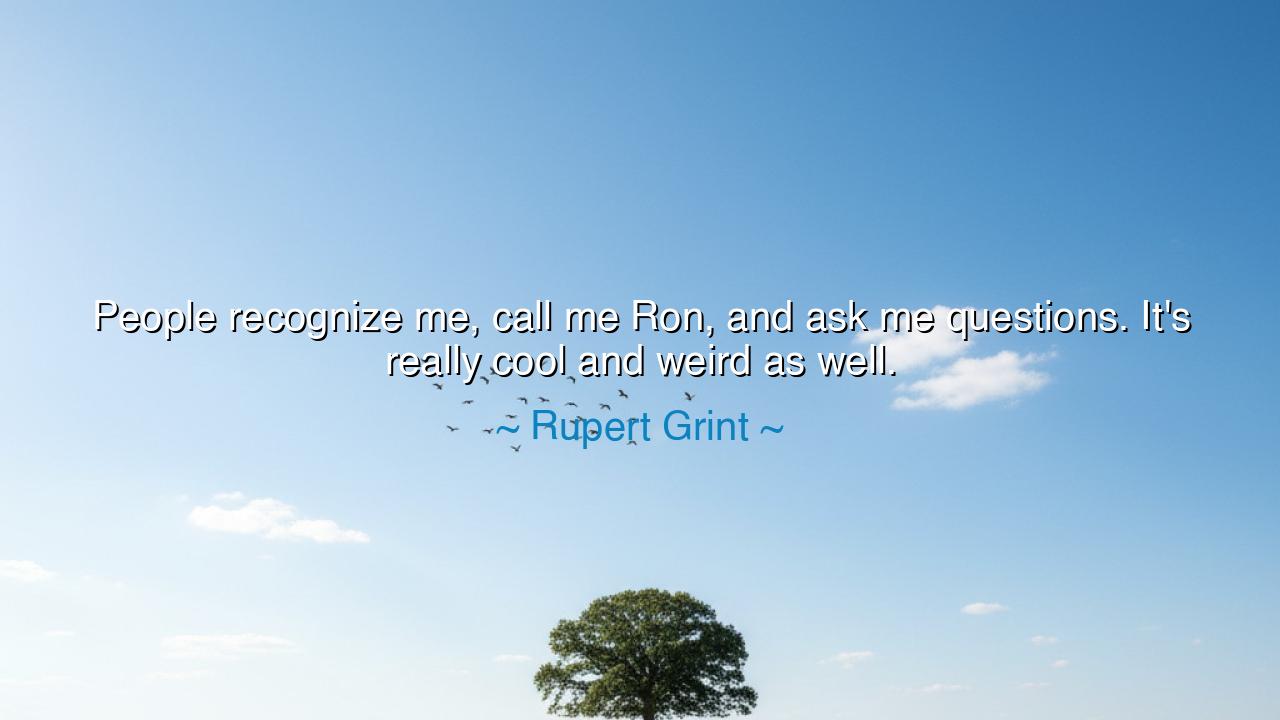
People recognize me, call me Ron, and ask me questions. It's
People recognize me, call me Ron, and ask me questions. It's really cool and weird as well.






"People recognize me, call me Ron, and ask me questions. It's really cool and weird as well." These words from Rupert Grint reveal the complexities of fame, identity, and the human experience. To be recognized not by your true name, but by a character you’ve played, is a profound reflection on how the world perceives us and the roles we take on in society. Grint's words speak to the duality of fame: the excitement of being acknowledged and the strangeness of having a public identity that feels at once familiar and foreign. His experience is not just that of an actor, but a universal experience for anyone whose identity becomes intertwined with a role they play—whether on the stage, in their family, or in society at large.
In the ancient world, the idea of identity and recognition was a powerful theme. Socrates, for example, sought to define his life not by external labels or the roles others ascribed to him, but by his pursuit of wisdom. Socrates did not want to be known merely as a teacher or philosopher, but as a seeker of truth, willing to engage in dialogue with anyone—noble or common—who sought deeper understanding. Yet, as Socrates’ fame grew, so did the expectation placed upon him by others. His identity became something greater than the man himself, and this weight of public perception became one of his burdens. Socrates, like Grint, experienced the disjunction between personal identity and the role the world perceived him to play.
Similarly, in the Roman world, figures like Julius Caesar grappled with the tension between personal identity and public recognition. Caesar was not just a ruler—he was a symbol, a living embodiment of Roman power. His public persona often overshadowed the man behind it. His rise to power transformed him from a soldier into an emperor, and his identity was continuously shaped by how others viewed him, not just by who he truly was. Caesar’s story echoes Grint’s—fame, while bringing recognition and influence, also carries a degree of alienation, as the individual is often seen through the lens of the role they play in the eyes of others.
The Greek philosopher Aristotle also explored the idea of identity in his ethical writings. For Aristotle, the self was an evolving concept, defined not by external labels, but by the actions one takes in accordance with virtue. In this sense, identity is not something static, but rather something that emerges through consistent and authentic action. Grint’s experience of being recognized as Ron Weasley, rather than Rupert Grint, speaks to this tension: while his public role has shaped much of how people see him, the true self is defined by how he chooses to live and act beyond the character he plays. The key, according to Aristotle, is finding a balance between the role society imposes on us and the authentic self we cultivate through our actions.
The story of Achilles in the Iliad provides another example of this tension between personal identity and the public role one must play. Achilles was both a warrior and a hero, known for his might on the battlefield. But his identity was conflicted—he was torn between the desire for glory and the deeper need for personal peace. His public identity as a warrior did not reflect the full depth of his humanity—a theme that Grint may understand intimately. Like Achilles, Grint is celebrated for his role as Ron, but the actor within him must navigate the complexities of how much of himself is shaped by the public’s perception.
The lesson in Grint’s reflection is one of self-awareness and authenticity. Fame, recognition, and public roles often come with the risk of losing sight of who we truly are. Just as Socrates sought wisdom beyond his public role and Achilles struggled with the expectations placed upon him, Grint reminds us that while recognition can be fulfilling, it is essential to stay connected to our true selves. The world may recognize us by our roles, but we must never lose sight of the deeper humanity that defines us.
In practical terms, the advice here is to live with integrity and self-awareness, regardless of the roles others assign to us. Whether in our personal or professional lives, we must learn to distinguish between who we are and how the world perceives us. Let us embrace our roles, but not let them define us completely. Just as Grint has navigated his fame with humility and awareness, we too must seek to be recognized for the authentic selves we cultivate through our actions, rather than simply the roles we are assigned by others. The path to fulfillment lies not in the recognition we receive, but in how we live with integrity and purpose, remaining true to our inner selves despite the roles the world may place upon us.






AAdministratorAdministrator
Welcome, honored guests. Please leave a comment, we will respond soon